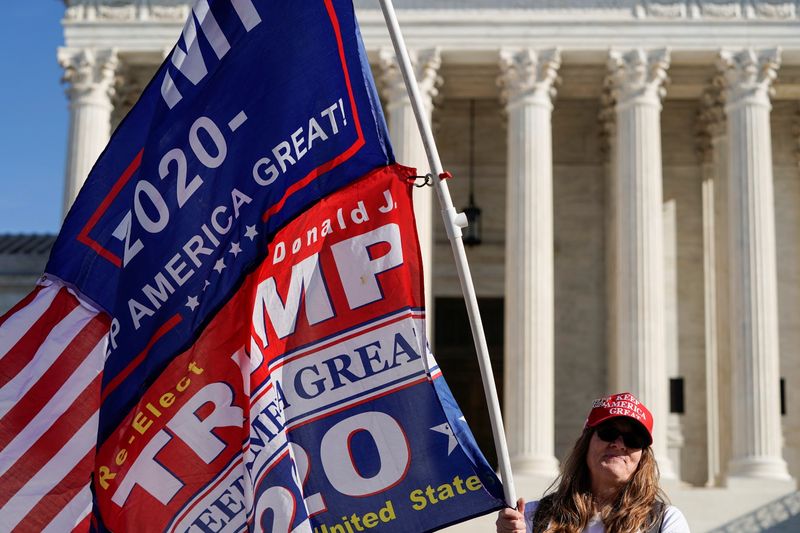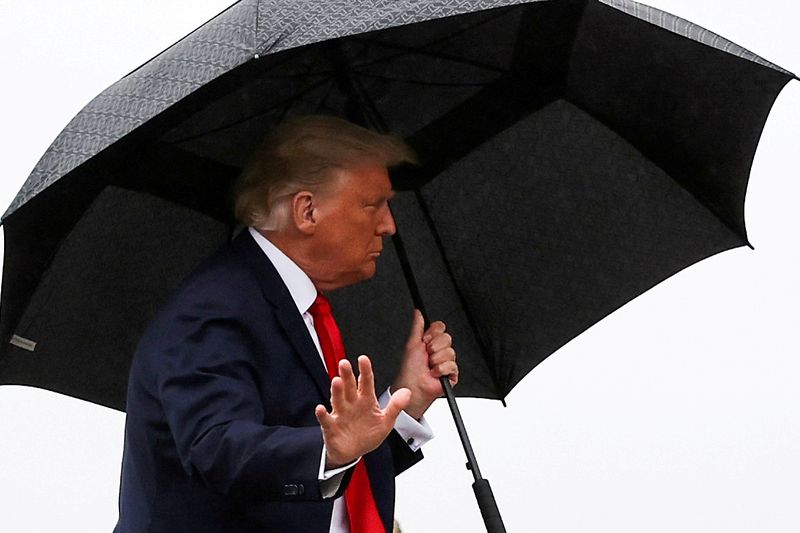By Lawrence Hurley
WASHINGTON (Reuters) -The U.S. Supreme Court on Friday rejected a long-shot lawsuit by Texas and backed by President Donald Trump seeking to throw out voting results in four states, dealing him a likely fatal blow in his quest to undo his election loss to President-elect Joe Biden.
The decision allows the U.S. Electoral College to press ahead with a meeting on Monday, where it is expected to formally cast its votes and make Biden's victory official.
Biden, a Democrat, has amassed 306 votes to Trump's 232 in the state-by-state Electoral College, which allots votes to all 50 states and the District of Columbia based on population.
The four states in question - Georgia, Michigan, Pennsylvania and Wisconsin - contributed a combined 62 votes to Biden's total. To win the White House, 270 votes are needed.
In a brief order, the justices said Texas did not have legal standing to bring the case, abruptly ending what Trump had touted this week as his best hope for overturning the election.
While Biden has moved forward with a wave of appointments for his incoming administration ahead of assuming office on Jan. 20, Trump and his legal team have filed a flurry of unsuccessful lawsuits in several states baselessly claiming voter fraud and challenging the results.
Trump's goal had long been for a case to reach the Supreme Court, where he had placed three new justices in his first term and where conservatives hold a 6-3 majority. The lawsuit brought by Texas and supported by 17 other states and more than 100 Republican members of Congress gave him that opportunity.
In the run-up the Nov. 3 election, Trump had pushed for the swift confirmation of Justice Amy Coney Barrett, with the publicly stated hope that she could be in a position to help rule on an election challenge.
But Barrett and the two other justices appointed by Trump - Neil Gorsuch and Brett Kavanaugh - signed onto the court's order derailing the Texas suit without comment.
"Texas has not demonstrated a judicially cognizable interest in the manner in which another state conducts its elections," the court's order said.
Two of the court's conservatives, Justice Samuel Alito and Justice Clarence Thomas, said they would have allowed Texas to sue but would not have blocked the four states from finalizing their election results.
Together with a case from Pennsylvania it was the second time this week that the court spurned the attempt to overturn the will of voters.
The Texas case was filed on Tuesday by Ken Paxton, the Republican attorney general of the state and a Trump ally. The Republican president on Wednesday filed a motion to intervene and become a plaintiff.
"There's no way to say it other than they dodged," White House spokeswoman Kayleigh McEnany said of the justices on Fox News Channel. "They dodged, they hid behind procedure, and they refused to use their authority to enforce the constitution."
A Biden spokesman said it was "no surprise" the high court rejected "baseless attempts" to deny Trump lost the election.
"Our nation's highest court saw through this seditious abuse of our electoral process," Pennsylvania Attorney General Josh Shapiro, a Democrat, said on Twitter.
Dana Nessel, Michigan's attorney general, also a Democrat, said in a statement that the ruling was "an important reminder that we are a nation of laws, and though some may bend to the desire of a single individual, the courts will not."
NO LEGAL GROUNDS
The Texas lawsuit argued that changes made by the four states to voting procedures amid the pandemic to expand mail-in voting were unlawful.
"It is unfortunate that the Supreme Court decided not to take this case and determine the constitutionality of these four states' failure to follow federal and state election law," Paxton said in a statement.
Trump and many of his fellow Republicans have made unfounded claims that the expansion of mail-in voting during the coronavirus pandemic led to Biden fraudulently winning in election battleground states.
State election officials have said they have found no evidence of fraud. Lawyers for Trump and his allies have failed to present evidence in court of the type of fraud he has alleged.
Democrats and other critics have accused Trump of seeking to shatter public belief in the integrity of U.S. elections and sabotage American democracy by trying to subvert the will of the voters.
Trump advisers in and out of the White House have long been resigned to Trump's defeat despite the president's quixotic quest to overturn the results. Trump has refused to concede the election and advisers expect him to continue to do so.

Trump's top legal advisers, Rudy Giuliani and Jenna Ellis, said the president's legal remedies were not exhausted and they would continue to work to invalidate the election ahead of Jan. 6, when Congress formally adopts the Electoral College results. Its role in doing so is largely ceremonial.
